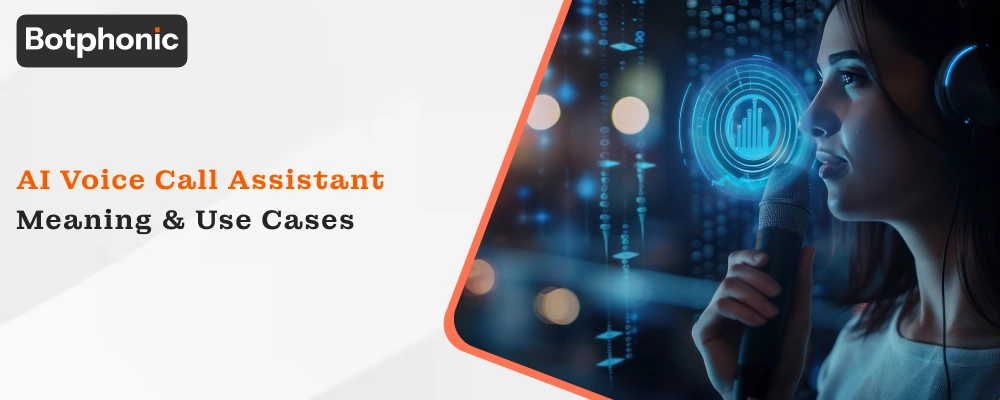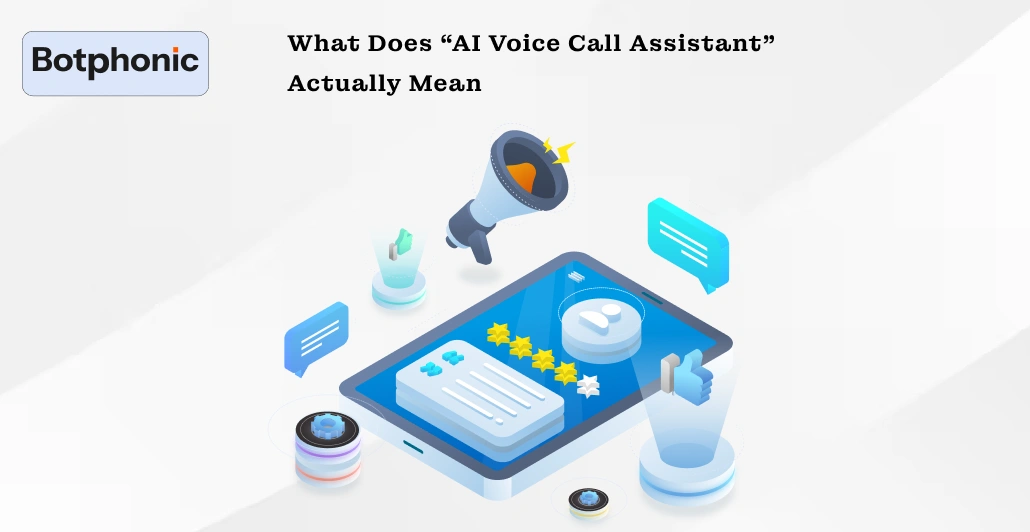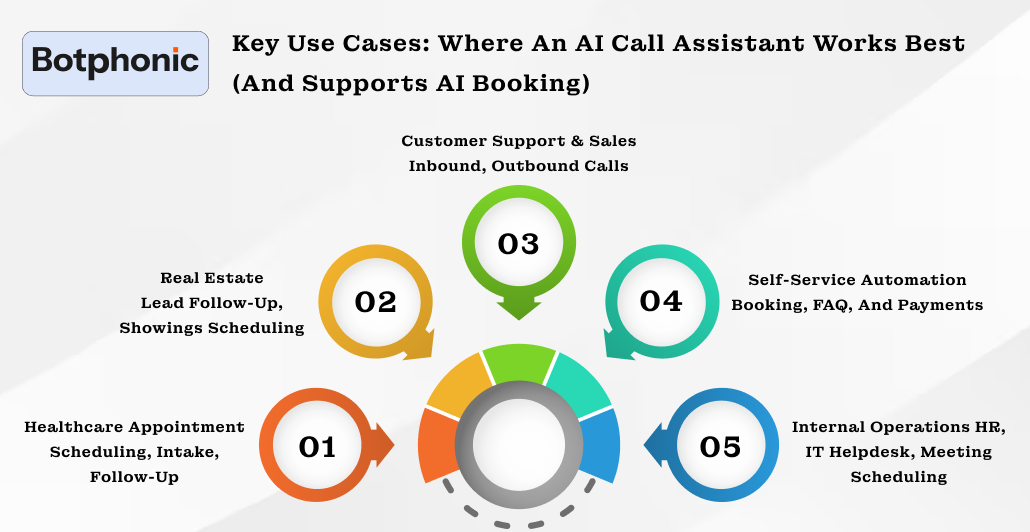
Summarize Content With:
Summary
This blog will help the reader to understand the concept of an AI voice call assistant, its main uses and advantages, as well as the technology behind it through real-life business examples. Additionally, we will demonstrate how Botphonic AI offers a range of excellent features for AI call assistants and AI booking, which you can utilise in your company.
Key Takeaways
- One outcome of the blog would be a clear understanding of what an “AI voice call assistant” means and how it differs from simple voice automation.
- You will know the core scenarios for using an AI call assistant and the connection between AI booking and tasks.
- The reader will understand how technologies like Botphonic AI can help implement these kinds of assistants in business scenarios, such as inbound, outbound, multilingual, and scalable.
- Some realistic business examples and a table summary will help you determine whether your company is ready for the deployment of AI voice call assistants and how to get started with them.
Introduction
What if your company is so overwhelmed with work that you cannot keep up with all calls, thereby losing potential clients, and not booking as many appointments as you could? Also, can you envision a system that never tires, picks up your calls, speaks to customers in a human-like manner, schedules appointments, redirects calls to the appropriate department, and is available 24/7?
That is precisely what an AI voice call assistant is meant to do. In this blog, we will explain what it means, why it is important, how an AI call assistant works, what AI booking looks like, and how it can benefit your business.
What Does “AI Voice Call Assistant” Actually Mean

When you come across a text saying “AI voice call assistant,” it should remind you of software that utilises the powers of artificial intelligence (AI), along with voice recognition and voice generation technologies, to completely replace a human in telephone interactions, or at least to handle them at a human level.
The system, in other words, can answer (inbound) calls, make (outbound) calls, figure out what the caller is asking for, respond naturally, set up meetings or solve problems, and, if necessary, let a human take over the conversation.
Let’s see how that works:
- “AI voice” means the assistant uses voice input (caller speaks) and voice output (assistant responds) instead of just text or chat.
- “Call assistant” means the system helps with phone calls: answering, making, routing, and scheduling. Hence, the keyword Ais ‘I call assistant.’
- Besides that, it continuously performs AI-based booking tasks, such as scheduling appointments, reserving resources, and confirming slots. You will find the term “AI booking” in numerous use cases.
Put simply, an AI voice call assistant is a digital assistant that can act like your co-worker but with fewer human attributes, answering your phone, listening, talking, scheduling, and, most importantly, taking the monotony off your shoulders. It is available 24/7, doesn’t require breaks, and is highly scalable. That is basically the core of the AI voice call assistant’s meaning.
Why Realtors Need AI to Transform Real Estate Sales | Botphonic Learn how AI is revolutionizing real estate and why realtors need AI to streamline operations and improve client engagement.How Does an AI Call Assistant Work in Practice?
To actually implement an AI call assistant, the promise of the technology and several technologies and steps need to come together. This is the entire chain of how it functions from start to finish:
- After the customer calls your business, the AI call assistant answers.
- Using speech recognition technology (ASR), it converts speech to text. After that, it uses natural language processing (NLP) to determine the caller’s intent (what the caller wants).
- The system figures out what the next step should be: for instance, it might direct the call, answer the question by itself, arrange a meeting (that’s AI booking), or simply gather more information.
- The AI agent in this case employs a human-sounding voice (text-to-speech, TTS) and delivers the answer.
- The machine not only keeps a record of the conversation but also updates the CRM or scheduling system and, if necessary, hands the task over to a human.
Eventually, the AI call assistant gets “smarter” with different patterns, more accurate recognition, better flow, and tailored responses.
Besides voice and call features, the Botphonic AI platform also provides no-code configuration, support for both inbound and outbound calls, multiple language voices, and 200+ app and booking system integrations.
As a single example, Botphonic says, “With the Botphonic AI phone call assistant, you can be present at every customer call even when you are busy and thus, you give the exact solution they need.
Key Use Cases: Where an AI Call Assistant Works Best (and Supports AI Booking)

Before going further, I would like to illustrate a few real-life scenarios where an AI call assistant could be particularly helpful (along with AI booking) across different sectors. These examples illustrate the resources and advantages of this concept.
1. Use Case: Healthcare – Appointment Scheduling, Intake, Follow-Up
In the healthcare sector, an AI call assistant has the capability to handle patient registration, schedule appointments, manage physician time sheets, and answer routine queries. As an example, Botphonic mentions that in the medical field, “it facilitates the execution of healthcare operational tasks such as the automatic registration process and reservation of appointment time. Time-sheet management of physicians, the automatics, etc.
In that use case, the AI assistant, through AI booking, displays available time slots, collects the patient’s confirmation, and sends reminders. In this way, unnecessary contact with the calling staff is reduced.
2. Use Case: Real Estate – lead Follow-Up, Showings Scheduling
Real estate agents are often drowning in the mess of the lead funnel; they miss inbound leads and spend hours cold calling. An AI calling assistant is a great solution for this problem. Botphonic highlights for real estate: “It helps potential clients arrange visits and book timing for in-person property visits.”
In this case, the AI booking component is most important: scheduling showings, confirming leads, and sending follow-ups.
3. Use Case: Customer Support & Sales – Inbound, Outbound Calls
An organisation overwhelmed by the volume of inbound customer engagement will find an AI call assistant that is always available to answer and address queries, qualify leads, arrange callbacks, and route to humans when necessary. Based on the data, “Voice AI can handle up to 65% of business calls, thereby freeing your team from the performance of repetitive tasks like answering FAQs, giving reminders, and routing calls.
Outbound use: the assistant is in a position to call leads, speak in a friendly manner, gather leads’ responses, and book the next activity (an AI appointment).
4. Use Case: Self-Service Automation – Booking, FAQ, and Payments
The use of self-service automation has been on the rise. The assistant is in charge of the call, which a human would have handled. For instance, an appointment booking, payment reminder, or inquiry. Botphonic emphasises this: “Self-service automation allows a virtual assistant to book an appointment or leave a message for the nurse.”
5. Use Case: Internal Operations HR, IT Helpdesk, Meeting Scheduling
The AI call assistant, which is usually considered a customer-facing tool, can also support internal operations, such as arranging interviews, providing IT support, and booking meeting rooms. Although these time-saving activities are less obvious, they still allow the team members to engage in strategic tasks. The transition of voice assistants to internal teams is well-documented in the provided resources.
If a call goes unanswered, a sale is lost. So, why not allow the AI call assistant of Botphonic AI to answer in an instant, speak naturally, and make appointments for you? It can be during the day or at night.
Request a Free DemoConclusion
Throughout the entire time, the blog has been primarily focusing on global voice and AI technologies, especially an AI voice call assistant, which the blog explains in great detail. Most notably, as the centrepiece of the voice call, AI booking was highlighted, and the blog illustrated how companies from various sectors are implementing this technology. In addition, the discussion revolved around Botphonic AI and its natural speech, conversation, integration, and scalability features.
In case your business is experiencing a situation where it keeps missing calls, has a hard time making bookings, and wants to scale customer service without spending a lot of money, then an AI voice call assistant might be the most suitable solution. Besides, if solid AI booking workflows are in place, the return on investment is measurable.
In short, AI-powered phone systems such as Botphonic.AI can radically change the way companies interact with customers, help in the automation of repetitive tasks related to call handling, and thereby make it possible to handle every incoming customer call in an efficient manner without compromising on quality. All these improvements can co-exist with enhanced productivity and customer satisfaction.
Little by little, choose the right platform, keep an eye on the results, and move forward with your expansion. Meanwhile, the assistant will be taking care of routine calls and bookings in an accurate manner.

